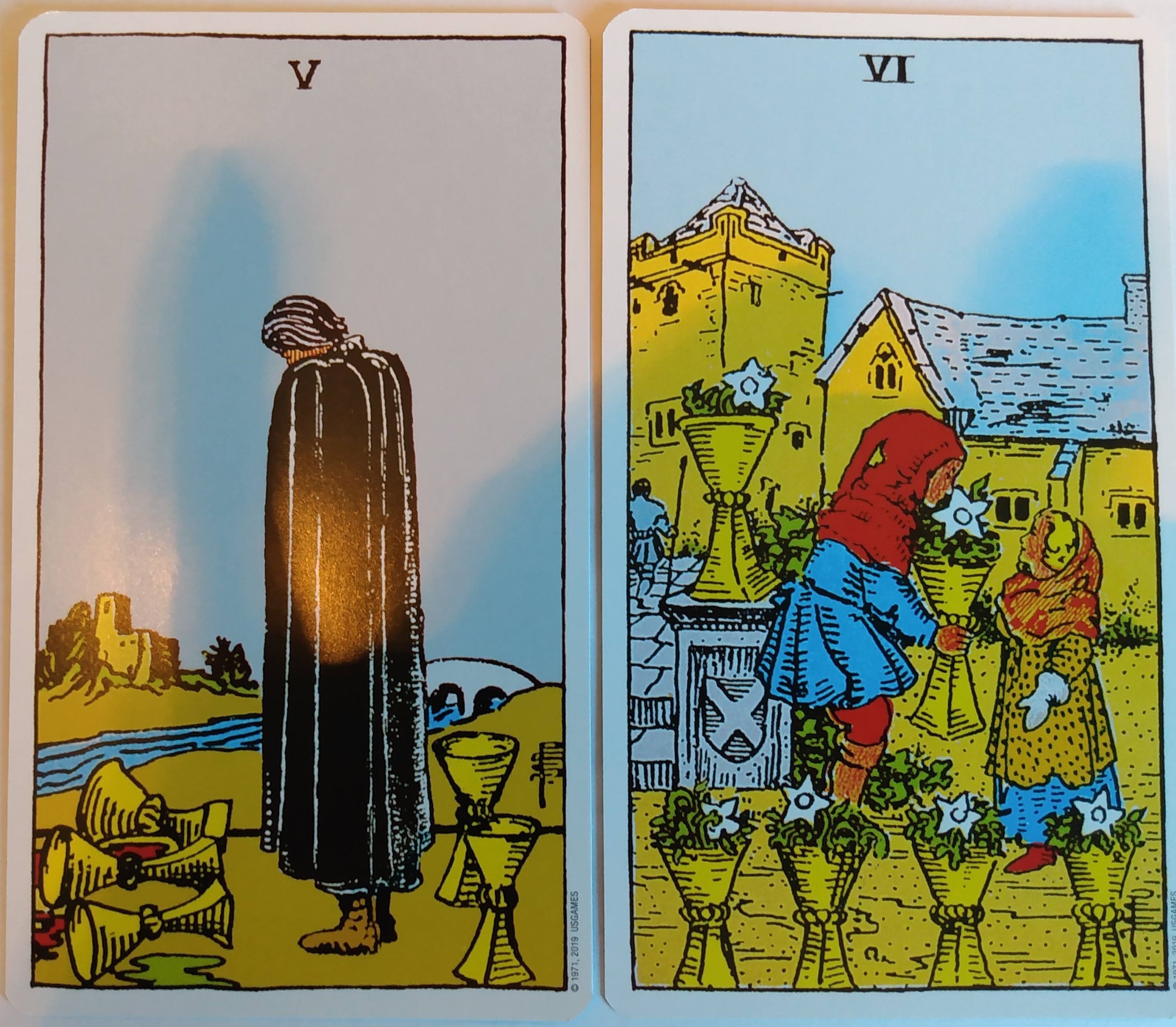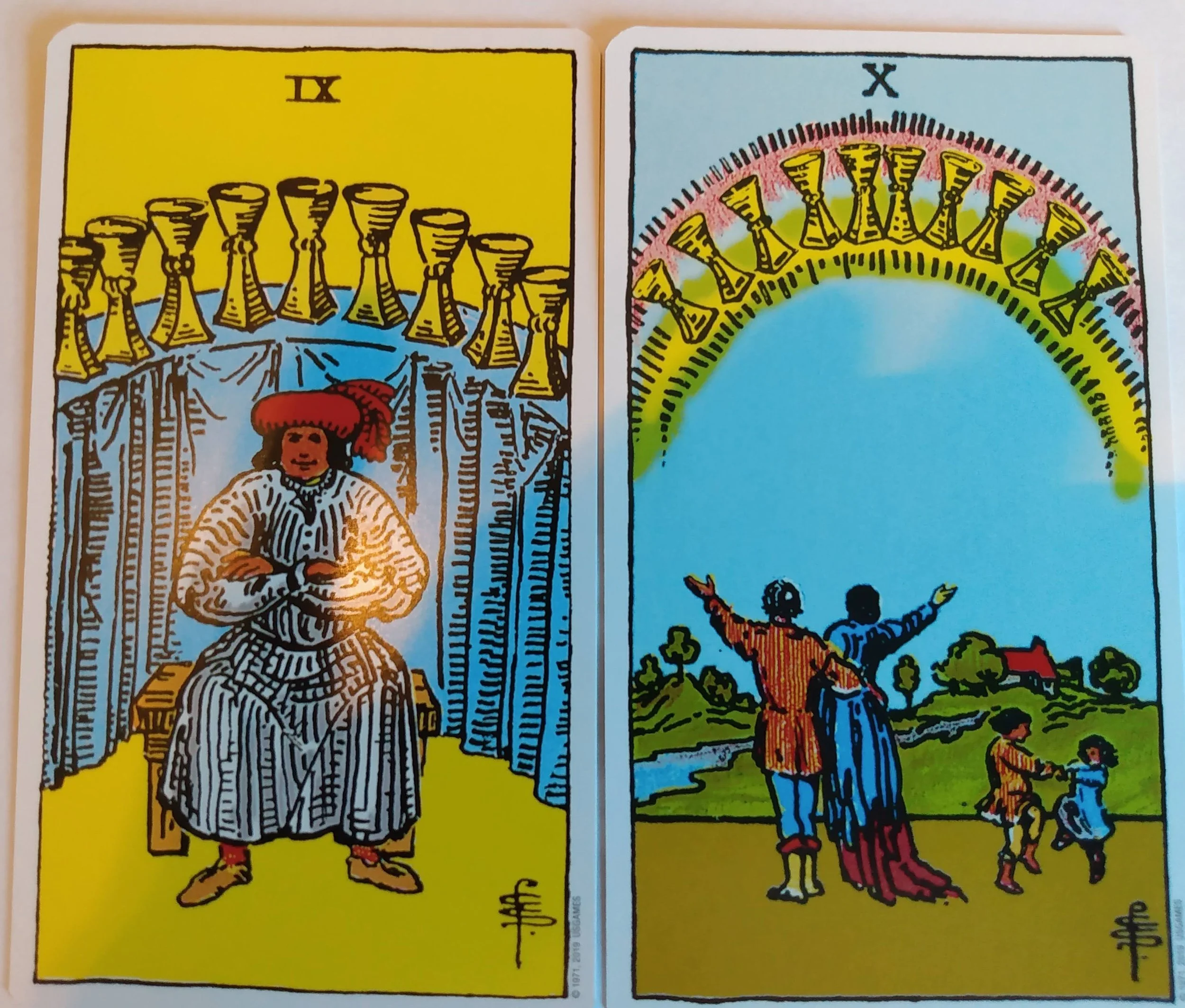Cups are the emotional suit in the tarot deck. These cards ask us to consider how feel about a subject.
Other topics that the cups suit is generally affiliated with include the arts, creativity, love, intuition, and relationships. In turn, they also have to deal with relating to others, loss, opportunities, choices, and knowing when to trust your gut feelings over “logic”.
The cup’s suit is associated with the water element, and the water-affiliated astrological signs: Cancer, Scorpio, and Pisces.
If you are new to tarot cards you might want to start with our article Intro To Tarot.
Cups Basics: What Do I Need to Know?
Each tarot suit has its own attributes that set it apart from the others. These attributes are things like the corresponding realm of life, associated elements and astrological signs, and more.
What does water have to do with tarot cards anyway?
Spiritually speaking, water represents our emotional inner world. This means that in tarot, when you pull a cups card, the deck is asking you to analyze the way your emotions are “flowing” at that moment.
To understand the “water as emotions” concept better, try to think about all of the different expressions you’ve heard involving water--or cups, for that matter.
“You can’t drink from an empty cup”
“Fill your own well”
“It’s all water under the bridge”
“Just go with the flow.”
“My cup runneth over”
Like water, our emotions can have varying depths.
While each cups card has its own unique meaning, it is important to be able to consider a few different perspectives in order to be able to determine how they might interact with others in the deck across different suits—and across different contexts.
Here are some examples of the cups suit as applied generally to some non-emotional topics—
Depending on which is pulled, a cups card pulled for an employment query (“Is this job opportunity right for me?”) might be a sign to consider the emotional angles of the question, such as, “is my heart in it? Will I feel good doing this job?”
Similarly, a cups card pulled for a travel query (“what will I learn on this trip?”) might have something to say about the emotional value of the trip—or about the relationship potential you may find while on it.
Flowing through the Cups Suit:
Now that we understand what the cups suit as a whole represents, let’s take a closer look at each card and see what they have to say about our emotional inner world. These are our thoughts and opinions.
To enrich your learning experience, we have included quotes from tarot scholar Arthur Waite’s work, The Pictorial Key to the Tarot, which was originally published in 1911.
Ace of Cups
The Ace of Cups is one of the most powerful Minor Arcana cards, as all Aces hold extra weight. Being the Ace of Cups, this Ace marks the sign of an emotionally-charged new beginning.
The Universe is offering a gift of love—be it romantic love, self-love, or an emotionally-fulfilling shift in employment. This is a great sign for new creative endeavors as well as budding love.
Here’s what Arthur Waite had to say about the Ace of Cups: “House of the true heart, joy, content, abode, nourishment, abundance, fertility; Holy Table, felicity hereof.”
Ace and Two of Cups. The Rider Tarot Deck produced by US Games
Two of Cups
The Two of Cups is one of the most relationship-heavy cards in the deck; to some, it’s known as “the marriage card”. This isn’t always literal—but it is generally about a connection that is ready to be taken to the next level. The key ideas here are harmony and union between individuals.
Here’s what Arthur Waite had to say about the Two of Cups: “Love, passion, friendship, affinity, union, concord, sympathy, the interrelation of the sexes, and […] that desire which is not in Nature, but by which Nature is sanctified.”
Three of Cups
The Three of Cups is all about celebrating with the people you love—and who love you back. This is about community, togetherness, and knowing that you aren’t alone. Sometimes this card is a sign that you’re going to find new love, or a fulfilling opportunity, through your wider network.
It’s a sign to honor those closest to you. Platonic love is valid. Mutual support is everything.
Here’s what Arthur Waite had to say about the Three of Cups: “The conclusion of any matter in plenty, perfection and merriment; happy issue, victory, fulfilment, solace, healing.”
Three and Four of Cups. The Rider Tarot Deck produced by US Games
Four of Cups
The Four of Cups takes a different tone—this is a card of apathy, boredom, and stagnation. It’s about closing yourself off from the opportunities offered to you or refusing to even look at them.
It signifies the times when our emotions can’t flow so freely, and we don’t know what we want. But the card is also a sign to shift that perspective and reconsider your circumstances. The magic you seek might be right in front of you.
Here’s what Arthur Waite had to say about the Four of Cups: “discontent with his environment […] weariness, disgust, aversion, imaginary vexations”
Five of Cups
The Five of Cups is all about knowing when it’s time to feel your feelings and grieve a loss—or when you’re crying over spilled milk and need to move on already.
When we experience loss, it’s important to take our time and let the emotions flow through us. But it’s also important to know when enough is enough--to understand that not all has been lost, after all.
Here’s what Arthur Waite had to say about the Five of Cups: “It is a card of loss, but something remains over; it is a card of inheritance, patrimony, transmission, but not corresponding to expectations; it [can be] a card of marriage, but not without bitterness or frustration.”
Six of Cups
The Six of Cups is frequently referred to as “the nostalgia card”. The thing about reflecting on the past is that we don’t always find that it’s how we remember it to be.
That’s OK. Your memories are yours to cherish. The most important takeaway is that this card reminds us that the past is in the past for a reason—it’s OK to remember it fondly, but it’s not OK to get stuck there.
Here’s what Arthur Waite had to say about the Six of Cups: “A card of the past and of memories, looking back; happiness, enjoyment, but coming from the past; things that have vanished.”
Seven of Cups
The Seven of Cups is a card of wishes and daydreams. This is one that reminds us to really think about what the heart wants when making a big decision.
We may be faced with a lot of opportunities at once, and a lot of the options might seem good on the surface… but it’s important that we make the decision that means the most to us, and that we have a plan to go after it with all we got.
We only get to make this choice once, after all.
Here’s what Arthur Waite had to say about the Seven of Cups: “images of reflection, sentiment, imagination, things seen in the glass of contemplation; some attainment in these degrees, but nothing permanent or substantial is suggested.”
Eight of Cups
The Eight of Cups is a sign to walk away from what doesn’t work. It’s not that you haven’t tried, or that you’ve done something wrong—sometimes things just aren’t right for us.
It’s empowering to know when it’s time to move on. Your new, truer path is waiting for you. So cut your losses and take that first step towards something new.
Something better, more fulfilling.
Here’s what Arthur Waite had to say about the Eight of Cups: “it is usually found that the card shews the decline of a matter, or that a matter which has been thought to be important is really of slight consequence”
Nine of Cups
The Nine of Cups is sometimes referred to as the “wishes granted” card. This is because the Nine of Cups is often a good sign that you are much closer to seeing your goals achieved than you think.
So, make that wish, follow your intuition, and get ready to see your wildest dreams come true. You’ve made it.
Here’s what Arthur Waite had to say about the Nine of Cups: “Concord, contentment; also victory, success, advantage; satisfaction for the Querent or person for whom the consultation is made.”
Cups nine and ten. The Rider Tarot Deck produced by US Games
Ten of Cups
The Ten of Cups is sometimes thought of as the “happily ever after” card, and it’s easy to see why. It’s usually depicted as a family celebrating under a rainbow—or some iteration of that.
But the nuance that is often forgotten is that the Ten of Cups can also refer to the present day. It’s a sign to reflect on how far you’ve come—and to look for contentment and happiness in your day-to-day.
“Happily ever after” might be closer than you think.
Here’s what Arthur Waite had to say about the Ten of Cups: “Contentment, repose of the entire heart; the perfection of that state; also perfection of human love and friendship.”
Page of Cups
Pages are often representative of young people—or are considered to be messengers. As such, the Page of Cups represents a creative, playful, childlike presence. It can also represent love messages, so if you’ve been looking for a good sign for your love life, this might be it.
Keep yourself open for messages from unexpected sources—a friend might make an introduction, or you might get a good gut feeling about a curious stranger.
You never know. Stay open.
Here’s what Arthur Waite had to say about the Page of Cups: “a studious youth; news, message; application, reflection, meditation; also these things directed to business.”
Page and Knight of Cups. The Rider Tarot Deck produced by US Games
Knight of Cups
The Knight of Cups, on the other hand, doesn’t always have such pure intentions. He can be romantic…but also a flirt. It’s a sign to be sure of your intentions moving forward—are you being emotionally honest? Is your partner? Are the emotional offerings on the table what you’re truly looking for right now?
Are they ripe with support—or just a burst of passion? Don’t rush things. Think it through.
Here’s what Arthur Waite had to say about the Knight of Cups: “Arrival, approach--sometimes that of a messenger; advances, proposition, demeanour, invitation, incitement.”
Queen of Cups
The Queen of Cups is generally representative of a nurturing, supportive, feminine presence in your life. She’s someone you can go to and cry with, and know that she will never judge you for it. She wears her heart on her sleeve.
This is admirable—but she is also prone to getting herself hurt because not everyone knows what to do with a heart like hers. Be mindful of your intuition.
Trust it more. Be compassionate—towards yourself, and others.
Here’s what Arthur Waite had to say about the Queen of Cups: “Good, fair woman; honest, devoted woman, who will do service to the Querent; loving intelligence, and hence the gift of vision; success, happiness, pleasure; also wisdom, virtue; a perfect spouse and a good mother.”
Queen and King of Cups. The Rider Tarot Deck produced by US Games
King of Cups
The King of Cups is the ultimate master of his emotions. He’s someone who knows when to lead with his heart—and when to put his emotions aside for the greater good.
He’s someone you can confide in; someone you can trust. He’s stable, mature, and paces himself. He navigates emotional depths with ease—and knows when to put a firm boundary in place.
Remember, there’s a difference between being cold and being protective of those that one loves.
Here’s what Arthur Waite had to say about the King of Cups: “Fair main…responsible, disposed to oblige the querent; also equity, art and science, including those who profess science, law, and art; creative intelligence.”
Author, Amber Mason, has a strong interest in tarot and green witchcraft but loves all things related to paganism & the esoteric. When she isn’t studying the tarot or meditating in the woods she can be found traveling the globe following the underground electronic music scene.












The first twenty-two tarot cards are known as the Major Arcana cards. They deal with the “major” aspects of our lives–who we are, what we want, and what we need to do in order to get it.
Think “big picture”.